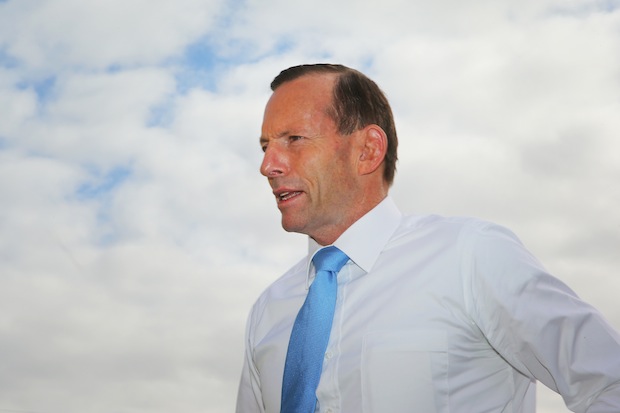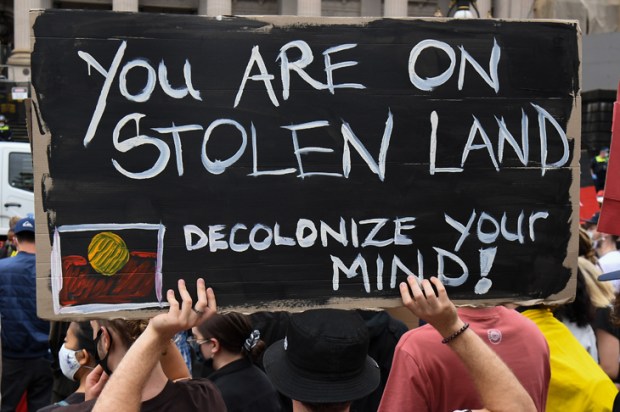The edition that the Bulletin brought out in 1988 to commemorate Australia’s bicentenary ended up being both a literary treasure trove and a historical time capsule. In its pages are found an essay on national identity — what else? — from Manning Clark (‘Some time during the 21st century, a nation of borrowers has to become a nation of creators’); a Bush rhapsody composed by Frank Moorhouse (the Bushman was still ‘the personification of Australia’); and a kindly take on Australia’s bush capital from Blanche d’Alpuget (‘It has charms that reveal themselves only to its residents, and only over time’). The British author and wit Keith Waterhouse was enlisted to write a paean to Sydney — ‘Miami Beach brushed with Ruislip.’ The broadcaster Phillip Adams called for ‘a declaration of independence’ from America. Yet it was the contribution from a young journalist called Tony Abbott that makes that edition of the Bulletin an especially significant document.
The future prime minister wrote an essay that appeared under the headline ‘The Rise and Fall of Anglo-Australia’. Reaching back to Federation, he chronicled the new country’s reluctance to break or stray too far from the old, and also its baby steps in forging a genuine Australian nationalism. ‘Time has killed British Australia,’ he observed of the country in 1988, ‘but has not yet put much in its place.’
That line about the death of British Australia came immediately to mind when Mr Abbott decided, unpredictably, to bring back knighthoods and damehoods. Evidently, he seemed intent on single-handedly resuscitating its lifeless corpse.
Writing in the Interpreter, the blog of the Lowy Institute, that quote became the starting point for a short post on how Abbott seemed to be putting into reverse the long and anguished process of detaching Australia from Britain — or its ‘conscious uncoupling’ to use a more voguish phrase. The return of knights and dames could be interpreted, I suggested, as a statement not of regional isolationism but certainly of regional separatism. It was a sign that Australia’s new prime minister was still wedded to the land of his birth and postgraduate education rather than the region which now he inhabits. Likewise, it could be taken as a signal of his preference for Australia to remain resolutely western rather than embracing Asia with greater enthusiasm.
Not only did the piece catch the eye of the editor of this august organ but also raised his ire. This line of reasoning, he wrote, was ‘ludicrous’. The reintroduction of knights and dames was nothing more than harmless symbolism. As for impinging on Asian relations, they should be judged by the level of co-operation witnessed during the hunt for MH370 and the trade deals negotiated since the Abbott government came to power. Kindly, he alerted me to the editorial. Even more generously, he offered me the chance to respond.
For outsiders especially, Australia’s sluggishness at dispensing with what Gough Whitlam called its colonial relics comes as a revelation. Perhaps it does for many Australians, too. Up until 1949, Australians remained British subjects. The word ‘British’ survived on the front cover of an Australian passport until the Whitlam era. ‘God Save the Queen’ survived as the national anthem well into the 1980s, long after the public had indicated a preference for ‘Advance Australia Fair’.
However, the trend, uninterrupted almost, of the past 60 years has been towards the abandonment of these symbols of Britishry. Tony Abbott, with this small but highly emblematic act, has reversed gears. The former executive director of Australians for Constitutional Monarchy has revived a heraldic honours system that feels more like Australia in the 19th century rather than Australia in the Asian century.
It is reminiscent in some ways of Robert Menzies’s attempt, at the time of decimilisation in the 1960s, to name what became the Australian dollar the Australian royal. That, too, drew a mocking response, which took Menzies and his then treasurer, Harold Holt, by surprise.
Even before his knight move, Abbott has already had his ‘I did but see her passing by’ moment, a reprise of Menzies’s hammy evocation of the words of the 17th-century British poet Thomas Ford as he paid tribute to the Queen at a banquet in Canberra. When Prince Harry visited Sydney last year, he proclaimed on the lawns of Kirribilli, ‘Prince Harry, I regret to say not everyone in Australia is a monarchist, but today everyone feels like a monarchist.’
Equally revealing were Abbott’s comments last year at his Oxford alma mater — Queen’s College, naturally — which was dubbed his Anglosphere speech. ‘China, Japan, India and Indonesia are countries that are profoundly important to Australia,’ the then opposition leader noted. ‘Size, proximity and economic and military strength matter. Of course they do; but so do the bonds of history, of shared values, and of millions of familiar attachments.’ Abbott also insinuated, more controversially, that Anglo-culture was pre-eminent: ‘Western civilisation (especially in its English-speaking versions) provides our comparative advantage among the cultures of the world’. The knighthoods underscore the message implicit in that speech. Despite claiming that he would lean more towards Jakarta than Geneva — a phrase he repeated during the 2013 campaign — it suggests he is more Buckingham Palace than Beijing.
To argue that Australia has to ditch or deny its British heritage to become a good Asian neighbour would indeed be ludicrous. As Bob Hawke, that dinky-di Aussie, noted in 1988: ‘In pinpointing what makes us distinctly Australian, we acknowledge the enormous debt we owe to Britain.’ The monarchy, the ultimate symbol of Australian Britishry, is enjoying an upsurge in popularity, as evidenced by last week’s visit of the Duke and Duchess of Cambridge and a poll greeting the couple’s arrival that made depressing reading for republicans.
Yet the reintroduction of knighthoods and damehoods does not merely reinforce the status quo. The prime minister has rebuilt some mental stepping stones to Britain, and the past, that most people thought had forever been taken away.
Got something to add? Join the discussion and comment below.
Get 10 issues for just $10
Subscribe to The Spectator Australia today for the next 10 magazine issues, plus full online access, for just $10.
Nick Bryant is a BBC correspondent, formerly in Sydney and now in New York.
You might disagree with half of it, but you’ll enjoy reading all of it. Try your first month for free, then just $2 a week for the remainder of your first year.














Comments
Don't miss out
Join the conversation with other Spectator Australia readers. Subscribe to leave a comment.
SUBSCRIBEAlready a subscriber? Log in